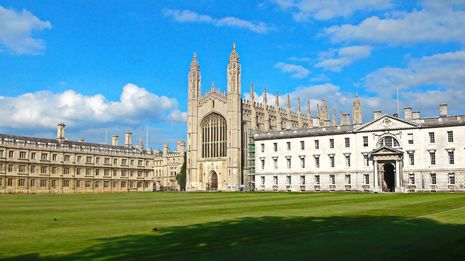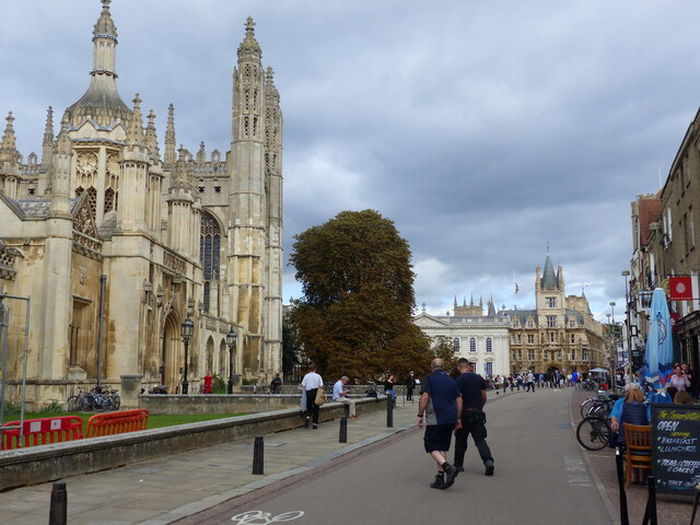What the University can learn from my first year
Reflecting on her own experiences as a fresher, Senior Opinion Editor Riannon Chaplin argues that there is more to be done to accommodate the needs of disabled students within the University ― and progress that must not be lost

To say that I was nervous before coming to Cambridge would be an understatement. I craved freedom but was terrified of being alone; I longed for academic exploration but was certain the workload would overwhelm me. Cambridge was my dream and, in a way, my nightmare – an idyllic unknown.
There was another layer of anxiety that gnawed at my mind after the elation of being accepted wore off. Being visually impaired meant I had to consider things other students did not – would I be able to access all of the reading? What would my peers think of me? And how would I learn to navigate my surroundings when the pandemic meant it was impossible for me to access orientation training? The truth is that the transition to university was always going to be difficult. But there are lessons for the University in my own experiences this year, and those of others in similar positions, that should be acted upon; after all, Cambridge should be somewhere people from all backgrounds can envisage themselves studying.
“To be able to access my degree only as an afterthought, a happy by-product of my non-disabled peers’ needs, is not right”
It may seem odd that I was relieved to hear that Cambridge would be conducting all teaching online, but for many students, this is the most accessible option. Rumours about continued online lectures next year have been filtering through recently; I cannot emphasise enough that this is not a decision to be scorned as lazy or neglectful. Teaching in an accessible format is imperative for all students – it just so happens that ‘accessible’ means different things to different people. For people like me, for whom not only travel but also the pace of lectures can be difficult and exhausting, having lectures uploaded online is a lifeline. Of course, all students should be able to attend in-person lectures, if they wish to – but this is a choice that many disabled students have never been granted, and one that must not be taken away.
In a similar way, increased access to texts in online formats due to the pandemic has been indispensable this year. As someone who relies on large print, physical books are inaccessible to me, and – although the service itself is brilliant – waiting for entire volumes to be sourced in digital or other formats by the University Library can take too long for weekly deadlines. Yet the fact that this accessibility was the result not of a desire to support disabled students, but to support the general student population unable to visit libraries due to the pandemic, is disheartening. To be able to access my degree only as an afterthought, a happy by-product of my non-disabled peers’ needs, is not right. And I sincerely hope that, as we emerge from the pandemic, this somewhat limited progress is built upon rather than erased.
To do this, decisions taken at every level must include disabled students. Rather than considering our needs as a separate issue, the interplay between our academic and social lives and our disabilities should be recognised. As a fresher, it has often been particularly isolating not knowing whether societies and events will be accessible to me, or whether organisers would be happy to make adjustments. We are definitely making progress, as schemes such as AccessAble demonstrate, but putting accessibility statements on event pages and adding detailed written descriptions or Alt Text to images can go a long way to ensuring students feel included, especially in a year like this. Put simply, rather than waiting to be told that a prospective member is disabled, it is best to assume that any potential member could be.
“Huge swathes of talented young people are being discounted, or are discounting themselves”
I am aware that many of the examples I am citing here relate to my own personal experiences, and I do not pretend to speak for others or to give the impression that my first year at Cambridge has been entirely negative. This year has been the best of my academic career so far; I have experienced the academic exploration and some of the freedom of living away from home, and have formed friendships I know will last. But the truth is that, even as I applied for Cambridge, I didn’t truly think it was for people like me.
The announcement last month of Cambridge’s first-ever Disability Open Days, which will take place online in mid-July, was certainly a welcome one for this reason. Targeted outreach was exactly what I had needed before applying: not only did I not know anyone who had attended Oxbridge, I also had never seen an Oxbridge student who looked like me. If I hadn’t attended a sixth form with a high number of applicants, I may not have had the confidence to consider it as an option at all, which means that huge swathes of talented young people are being discounted, or are discounting themselves, particularly due to the interplay between disability, socio-economic disadvantage and other areas targeted by outreach programmes. It is early days, and an Open Day is a much-needed step forward. But until we remove the systemic barriers which create added and unnecessary difficulties for many disabled students – ranging from a lack of encouragement at school to inaccessible exam papers and beyond – this outreach cannot be fully effective.
Have all the fears I entered Cambridge with come true? No. But there is still work to be done to ensure that no student arrives at Cambridge with fears related to inadequate provision, or worse still, that these fears are a barrier to applying. The dream of Cambridge should not feel like a nightmare. The Cambridge ideal, even if somewhat unrealistic, should be accessible to all.
 News / Colleges charge different rents for the same Castle Street accommodation2 March 2026
News / Colleges charge different rents for the same Castle Street accommodation2 March 2026 News / News in Brief: waterworks, wine woes, and workplace wins 1 March 2026
News / News in Brief: waterworks, wine woes, and workplace wins 1 March 2026 News / Climate activists protest for ‘ethical careers policy’1 March 2026
News / Climate activists protest for ‘ethical careers policy’1 March 2026 News / Angela Merkel among Cambridge honorary degree nominees27 February 2026
News / Angela Merkel among Cambridge honorary degree nominees27 February 2026 News / Private school teacher who lied about Cambridge degree barred from teaching27 February 2026
News / Private school teacher who lied about Cambridge degree barred from teaching27 February 2026









